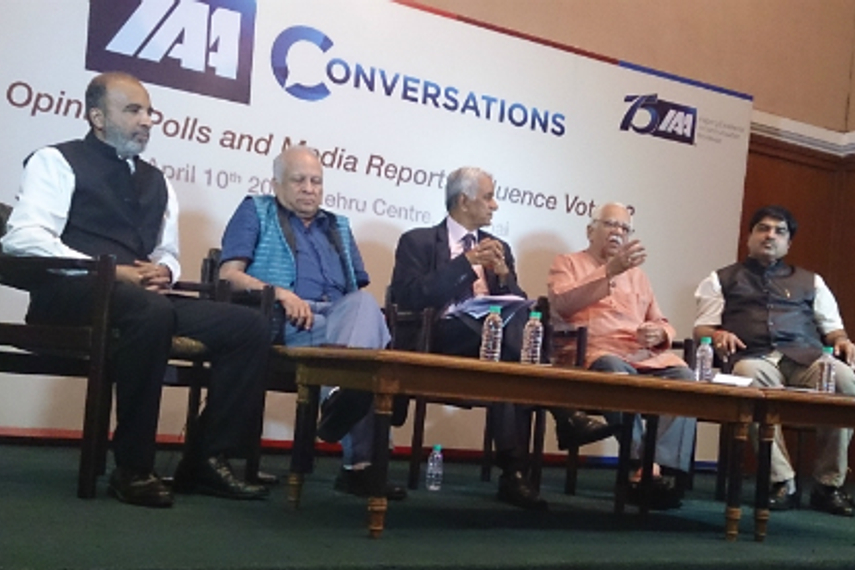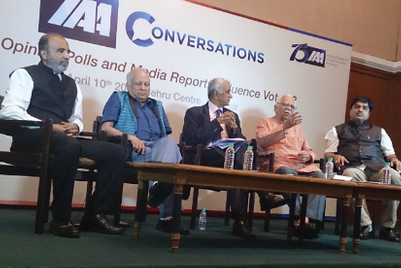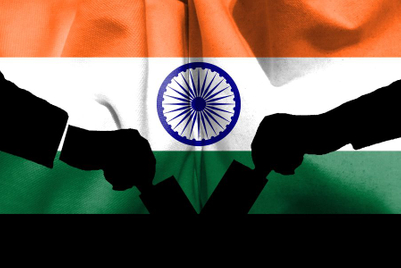
The second event in the IAA Conversations series was hosted in Mumbai today, 10 April 2014. Among the discussions witnessed was one on opinion polls, and their influence on voters.
Discussing the topic were Shiv Sena’s Prem Shukla, BJP’s Ram Naik, Anand Rathi Securities’ Anand Rathi (moderator), political analyst Kumar Ketkar and Congress spokesperson Sanjay Jha (R to L pictured above).
‘Trusting the foreteller’s parrot’
“Even if you want to map the sentiment of people (not results), you have to speak with at least 10,000 people in each constituency,” argued Shiv Sena’s Shukla. He added, “People who have no understanding of the political realities are sitting somewhere far away and doing these surveys.”
He cited the example of an opinion poll by a news channel that predicted 22 seats for the BJP in Maharashtra but only three for its ally Shiv Sena, and questioned the logic of it.
“They take the results of the last elections and consider this year’s trends, and combine them to present a result suited to whoever is sanctioning the poll,” contended Shukla.
He quipped, “Unless you make the methodology transparent and robust, it is like trusting the foreteller’s parrot.”
Moderator Rathi pointed out that there were scientific statistical methods adopted, and further reasoned, “There’s the credibility of the organisation sanctioning the survey that is at stake too.”
Shukla however ceded that fence-sitters in the electorate would veer towards the camp that seems to be winning in the opinion polls.
BJP’s Naik said that opinion polls offer another discussion to get people to think about whom to vote for. On its influence on voters, he begged to differ from Shukla, and said, “The influence on voters is not so much. But if a party is seen to be winning, it can be a positive influence on the workers of th party, and encourage them to work harder and reach out to more people.”
‘We lose opinion polls, win elections’
Congress’ Jha said, “We have gone used to the fact that Congress loses opinion polls, but wins elections. We’ve seen it happen in two successive elections.”
He prompted the audience to think of who was commissioning and supporting opinion polls.
Responding to a question on who according to him was funding them, he countered, “This election, some prominent industrialists have opened their coffers to support certain people. The industrialist has only one vote. So does the farmer in the village. We will know the verdict when it comes.”
Reiterating that some fence-sitters would be swayed by opinion polls, Ketkar urged caution in attaching too much importance to them. He pointed to the example of Mayawati, who has defied opinion polls repeatedly. He also urged the audience to remember the first opinion poll when Indira Gandhi was predicted to lose badly. That prediction too went wrong.
Ketkar pointed out that while opinion polls were simple earlier, today they had become amplified with television debates and promotions akin to big ticket Bollywood releases (like Ra.One).
Citing his own experience from a TV studio, he said, “I was asked on TV to reflect on the finding of an opinion poll. In 2009, they said Congress had garnered 27 per cent of the votes – which was the actual figure. In 2014, their opinion poll – opinion poll - says Congress will poll 14 per cent of the votes. So they ask me, ‘So Mr Ketkar, why is there a loss of 13 per cent votes?’ For the last one year, even I have learnt to entertain myself in television studios.”
Veering back to the subject of BSP leader Mayawati, and role of media in influencing voters, Ketkar pointed out to the audience that she had not given a single media interview in the last 14 years, does not have journalists in front rows for her campaign speeches, and is not accompanied by journalists on her campaign trail. “In the entire run up to the elections, Mayawati is (near) invisible. Yet she gets the votes.”
Jha surmised, “Media has a role. But people will vote with their independent thinking, with their heads and their hearts.”
Also read: IAA Conversations: ‘Media does play a role in influencing voters. But...
(Editor’s note: The ‘Conversations’ happened in Hindi, and are being reported in English. So there may be some degree of compromise in the quality of translation.)


.jpg&h=334&w=500&q=100&v=20250320&c=1)
.jpg&h=334&w=500&q=100&v=20250320&c=1)
.jpg&h=334&w=500&q=100&v=20250320&c=1)
.jpg&h=334&w=500&q=100&v=20250320&c=1)
.jpg&h=334&w=500&q=100&v=20250320&c=1)
.jpg&h=334&w=500&q=100&v=20250320&c=1)
.jpg&h=334&w=500&q=100&v=20250320&c=1)
.jpg&h=334&w=500&q=100&v=20250320&c=1)
.jpg&h=334&w=500&q=100&v=20250320&c=1)





.jpg&h=268&w=401&q=100&v=20250320&c=1)
.jpg&h=268&w=401&q=100&v=20250320&c=1)


